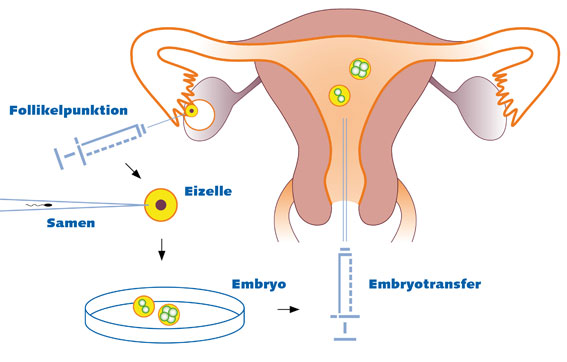Intracytoplasmic Sperm Injection(ICSI)
Intracytoplasmic sperm injection, or ICSI, involves injecting a single live sperm directly into the center of a human egg. The technique was developed to help achieve fertilization for couples with severe male factor infertility or couples who have had failure to fertilize in a previous in vitro fertilization (IVF) attempt. The procedure overcomes many of the barriers to fertilization and allows couples with little hope of achieving successful pregnancy to obtain fertilized embryos.
The procedure requires that the female partner undergo ovarian stimulation with fertility medications so that several mature eggs develop. These eggs are then aspirated through the vagina using vaginal ultrasound, and incubated under precise conditions in the embryology laboratory. The semen sample is prepared by centrifuging, or spinning the sperm cells through a special medium. This separates live sperm from debris and most of the dead sperm. The embryologist then picks up the single live sperm in a glass needle and injects it directly into the egg.

ICSI is considered absolutely necessary is in the case of male factor infertility with an abnormal semen analysis. In the Bay Area, however, about 75 percent of all IVF cases are now ICSI. Patients are electing to undergo ICSI for reasons other than male factor infertility, including:
- Previous poor fertilization with IVF
- Variable sperm counts
- Unexplained infertility
Many patients choose to undergo the ICSI procedure in order to maximize their success even when the procedure is not clearly indicated. If you have been told that there are abnormalities with any sperm test results, you should give serious consideration to ICSI. If the male partner has had a vasectomy reversal, we also recommend ICSI regardless of the sperm quality because of the presence of sperm antibodies that may affect fertilization. The decision to proceed with ICSI is particularly difficult if there is no prior evidence of male factor infertility. Some couples choose ICSI because they want to do everything possible to maximize fertilization. However, it is important to understand that for many couples with normal sperm parameters, maximal fertilization can be achieved with standard insemination during IVF without the use of ICSI.
